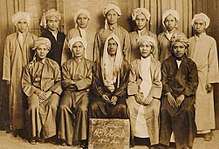Indonesians in Saudi Arabia
Indonesians in Saudi Arabia consist largely of female domestic workers, with a minority of other types of labour migrants. As of 2014, an estimated 1,500,000 Indonesians were believed to be working in Saudi Arabia, comparable to the numbers of migrants are the groups from Bangladesh, India, Philippines and Pakistan, which number between 1 and 4 million people each.[3]
 Indonesian Islamic scholars in Makkah, 1955 | |
| Total population | |
|---|---|
| 1,500,000(2014)[1] | |
| Regions with significant populations | |
| Jeddah, Mecca, Madinah, Riyadh | |
| Languages | |
| Indonesian, Arabic, Javanese[2] | |
| Religion | |
| Sunni Islam[2] |
A large number of Indonesian expatriates in Saudi Arabia also work in diplomatic sectors or are employees to local or foreign companies located in various provinces of Saudi Arabia such as Saudia Airlines, SABIC, Schlumberger, Halliburton, or Indomie. Many of Indonesians are also employees to the world's biggest oil company Saudi Aramco with their families locating in the Dhahran area. Most of Indonesians in Saudi Arabia reside in Riyadh, Jeddah, Mecca, Medina, and all around Dammam area.
The Indonesian government signed an agreement with Saudi Arabia and other Middle Eastern governments on manpower exports in 1983; in that year 47,000 Indonesians went to Saudi Arabia. Their numbers grew rapidly; in the five-year period starting in 1989, Saudi Arabia took in a total of 384,822 Indonesian workers, 59% of all labour migration from Indonesia during that period.[2] Indonesian domestic workers find themselves quite vulnerable to abuse and exploitation by labour brokers and their employers, and the Indonesian government are reluctant to advocate very strongly on their behalf, for fear that the Saudi government might respond by cutting back on the number of visas issued to Indonesians performing the hajj. Ironically, Indonesian domestic workers typically find themselves unable to perform hajj or umrah during their stay in Saudi Arabia.[4]
Recruiters seeking to hire Indonesian women to work in Saudi Arabia typically focus their efforts on pesantren (Islamic boarding schools) in rural areas. Pesantren students are likely to have learned some Arabic in the course of their religious studies, which eases their communication with their employers; Saudi Arabia as a destination is more likely to appeal to devout Muslims such as the typical students at these schools, and employers in Saudi Arabia are also more comfortable hiring Muslims.[2] However, regardless of the religious bond, Saudi employers are often surprised that the Indonesian government allows unaccompanied women to travel and work overseas, unprotected by male relatives; they perceive the presence of Indonesian domestic workers in Saudi Arabia as representing a moral and economic failure on the part of the Indonesian government and the women's families.[4]
Roughly 39,000 Indonesians in Saudi Arabia registered to vote in Indonesia's 2004 presidential election through one of the 27 polling stations set up for them in the kingdom; they represented nearly half of all Indonesian in the Middle East who registered to vote.[5]
Indonesian pilgrims have long lived in Hejaz, a region along the west coast of Saudi Arabia. Among them was Shaykh Ahmad Khatib Al-Minangkabawi who was from Minangkabau origin in Sumatra. He served as the Imam dan the scholar for the Shafi'i school of taught at the Grand Mosque in Mecca during the late 19th century.[6] Most of the santris (Islamic boarding school pupils) from Indonesia also have continued to pursue their education in Saudi, such as in the Islamic University of Madinah and the Umm al-Qura University in Mecca.
Saudis of Indonesian descent
There are Saudi citizens who reside in Mecca and Jeddah that are of Indonesian descent. Their forefathers came from Indonesia by sea during the late 19th century til the mid 20th century for pilgrimage, trade, and Islamic education purposes. Many of them did not return to their homeland thus they decided to stay in Saudi and their descendants have become Saudi citizens ever since. Many of them also married with local Arab women and stayed permanently in Saudi. Their descendants today are recognizable with their family name originating from their forefathers' origins back in Indonesia, such as "Bugis", "Banjar", "Batawi" (Betawi), "Al-Felemban" (Palembang), "Faden" (Padang), "Al-Bantani" (Banten), "Al-Minangkabawi" (Minangkabau), "Bawayan" (Bawean), and many more. One of them is Muhammad Saleh Benten, a Saudi politician appointed by King Salman as the Minister of Hajj and Umrah.[7]
The former Indonesian Ambassador to Saudi Arabia, Gatot Abdullah Mansyur stated that 50% of Mecca residents are of Indonesian descent. This has been possible because of trade between the two nations, since the era of the Rashidun Caliphate with the Malay archipelago in the old times.[8]
References
- Kompasiana (2016). Kami Tidak Lupa Indonesia. Bentang Pustaka. ISBN 9786022910046.
- Silvey, Rachel (2005), "Transnational Islam: Indonesian Migrant Domestic Workers in Saudi Arabia", in Falah, Ghazi-Walid; Nagel, Caroline (eds.), Geographies of Muslim Women: Gender, Religion, and Space, Guilford Press, pp. 127–146, ISBN 1-57230-134-1
- "Migrant Communities in Saudi Arabia", Bad Dreams: Exploitation and Abuse of Migrant Workers in Saudi Arabia, Human Rights Watch, 2004
- Diederich, Mathias (2004), "Indonesians in Saudi Arabia: religious and economic connections", in Al-Rasheed, Madawi (ed.), Transnational Connections and the Arab Gulf, Routledge, pp. 128–146, ISBN 0-415-33135-8
- "Indonesians in Saudi Arabia register to vote presidential polls", BNA Reports, Bahrain News Agency, 2004-07-05, retrieved 2008-05-06
- Ricklefs, M.C. (1994). A History of Modern Indonesia Since c. 1300. Stanford University Press.
- Mohammed Saleh Benten, Menteri Arab Saudi Keturunan Banten. Ini Profilnya (Mohammed Saleh Benten, A Saudi Minister of Banten Descent. This is his Profile) (in Indonesian), Nusantarakini.com, retrieved 23 September 2019
- Mantan Dubes RI: 50 Persen Penduduk Makkah Keturunan Indonesia (Former Indonesian Ambassador: 50 percent Mecca residents are of Indonesian descent (in Indonesian), Republika.co.id, retrieved 23 September 2019
Further reading
- Husson, Laurence (1997), "Les Indonésiens en Arabie Saoudite pour la foi et le travail/Indonesians in Saudi Arabia for worship and work", Revue européenne des migrations internationales, 13 (1): 125–147, doi:10.3406/remi.1997.1535
- Silvey, Rachel (2004), "Transnational Migration and the Gender Politics of Scale: Indonesian Domestic Workers in Saudi Arabia, 1997-2000", Singapore Journal of Tropical Geography, 25 (2): 141–155, doi:10.1111/j.0129-7619.2004.00179.x
